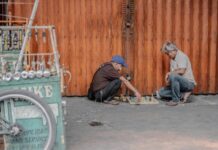This year too, Hyderabad people celebrating the holy Ramzan in lockdown despite the pandemic restrictions and protocols.
With no large congregations in mosques, no ‘iftar’ parties and no late night shopping, it was said 2020 Ramzan was like no other in living memory. But as a second, deadlier COVID-19 wave ravages large parts of the country, Ramzan 2021 has rewritten even that pandemic norm.
The shadows over Ramzan are darker this time and the despair deeper, the scramble for oxygen, hospital beds and even a decent burial for their loved ones eclipsing the gloom that marked the fasting month last year.
Almost every family across the country is affected by the pandemic in one way or another with many losing friends and family members and several others battling the dreaded virus. “Ramzan is a time for family and friends, but this year I have lost many of my near and dear ones and many in the family have been infected by the virus. This has been a tough month and I spent it just praying to Allah that this deadly virus goes away from our lives,” said Tanvir Parvez, a lawyer from Ghaziabad.
The festivities, the cheer, the morning ‘sehri’ at food joints that underscored Ramzan and Eid for not just devout Muslims but for others as well have receded like a distant dream for those like Parvez. Who would have thought that instead of dwelling on the spread laid out across virtually every dining table in a Muslim household at ‘iftar’, families this Ramzan would be sweating over arranging oxygen cylinders, oxygen concentrators, hospital beds and plasma or a burial spot for friends and family hit by the deadly virus.
As the holy month of Ramzan nears its end with Eid likely to be celebrated on May 13 or 14 in India, depending on the sighting of the moon, Covid fears hang like a cloud over the festivities.
“This year, the fasting month went by running around dealing with health emergencies, deaths and funerals for relatives and friends,” said Qazi Rafat Masood, an agriculturist from Uttar Pradesh’s Nagina district. Though mosques have been open in many places during Ramzan, prayers were held with COVID norms and restrictions. Also, many appeals were made by clerics asking people to pray at home, especially in Covid hotspots.
This year, somewhat like last year, it has been about lockdowns, deserted streets and shuttered shops — symbolic of the emptiness during what is generally a festive time. The special Eid prayers will also not be the same. In several cities, it has been decided that prayers will not be held in Eidgahs but in local mosques with social distancing norms. At other places, calls have made urging people to offer Eid prayers at home.
“I appeal to all Muslims to perform Eid prayers following all local Covid-related protocols and guidelines. Do not gather in large numbers and it would be best that you perform prayers inside your homes,” told prominent Muslim body Jamiat Ulema-e-Hind president Maulana Arshad Madani.
Social media is also abuzz with calls for celebrating Eid in accordance with Covid protocols with hashtags such as ‘EidAtHome’ and ‘SayNoToEidShopping’ doing the rounds on Twitter!
This Ramzan, several people also missed their fasts after getting infected by coronavirus and lamented about not being able to fast throughout the duration of the holy month.
As Muslims mark the end of the holy month and head for Eid, there is just one thing on everyone’s mind — to pray for this pandemic to end. Ramzan is the ninth month of the Islamic calendar during which Muslims worldwide refrain from eating and drinking from dawn to dusk and end their fast in the evening. #KhabarLive #hydnews







